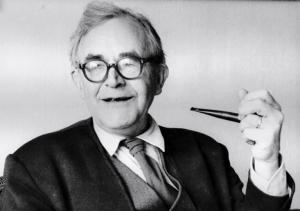Karl Barth in a Youtube Documentary Not about Him
The great Swiss theologian Karl Barth has often been described as a modern “church father.” That is to compare him in terms of greatness of thought and influence to such Christian theologians as Saint Augustine. I have studied the theology (or theologies) of Barth for many years and he is one of my favorite Christian theologians. I have written about him here before.
Imagine my surprise to catch a glimpse of him in a Youtube documentary about the Nazi leader Albert Speer (pronounced “shpeer”). If you don’t know who Albert Speer was, look him up on Wikipedia. Historians have called him “The Nazi who said ‘sorry’” and Hitler’s best friend. At the Nuremberg trial he was sentenced to twenty years in prison rather than hanged as were most of the convicted Nazi leaders. After release in 1966 Speer wrote his autobiography Inside the Third Reich and, most often, denied knowing anything about the Holocaust when he was a minister in the German government.
According to this very fascinating and believable documentary, after his release from Spandau Prison in Berlin, Speer sought out a French (or Swiss) Christian he knew and asked him to help him meet with Holocaust survivors. The documentary tells the name of his friend, but I don’t recall it and never heard of him. However, the Swiss/French friend (or acquaintance) is shown getting up from a table where he had been having conversation with several other men. The face of Karl Barth jumped at me from across that table! There was no mistaking him. I almost jumped when I saw him. The documentary never mentions him, but there he was, for a few seconds.
Now, Barth died in Basel, Switzerland, in 1968. This event happened in either 1966 or 1967. To me, this was like (most people) seeing their favorite super star athlete for a brief moment just sitting at a table without his presence being mentioned by the documentary maker. You would probably think “What? Why didn’t they mentioned his presence there?”
I could write many blog posts here about Karl Barth and his theology. I did write a lengthy and somewhat controversial chapter about Barth’s theology in my book The Journey of Modern Theology (IVP). It was controversial because one editor of the manuscript insisted that I was wrong about the development of Barth’s thought because I agreed with Barth historians and scholars Hans Urs von Balthasar and Gary Dorrien rather than Bruce McCormick. That editor studied with McCormick at Princeton and, like many Barth scholars then (a couple decades ago) thought McCormick had the last word on the subject.
I have met many leading Christian theologians over the years including: Hans Kueng, Wolfhart Pannenberg, Juergen Moltmann, Gary Dorrien, James Cone, Rosemary Ruether, Gustavo Gutierrez. I could go on naming them. But, of course, I never met Karl Barth. I have known a few people who did. However, I have read several biographies of him including the magisterial one by Eberhard Busch. And I have read many of Barth’s books including most of Church Dogmatics.
Not long before his death, Karl Barth graced the cover of TIME magazine which included a feature story on him and his theology. I own that magazine. (I also own the ones that feature Reinhold Niebuhr and Paul Tillich on their covers.) To me, these are like rare baseball cards are to baseball fans. Yes, I’m a theology nerd.
If I were the maker of that documentary, I would have at least put a caption over Barth’s head pointing down saying “famous theologian Karl Barth.”) I’m sure most people who see the documentary don’t know they are catching a glimpse, in a very unlikely “place” (a documentary about Albert Speer!), of the world’s greatest Christian theologian (of the time the documentary is about).
The documentary (whose title I forget) focuses on Albert Speer’s career, trial, and post-imprisonment seeming confusion about what he knew and didn’t know about the Holocaust when it was happening. The ultimate conclusion, based on letters Speer wrote that were discovered after his death, is that Speer did know but went into denial about it. He claimed to a writer that he did not know but “looked away.” In other words, he could have known and probably did know something, but chose to pretend, even to himself, that he didn’t know.
*If you choose to comment, make sure your comment is relatively brief (no more than 100 words), on topic, addressed to me, civil and respectful (not hostile or argumentative), and devoid of pictures or links.*














